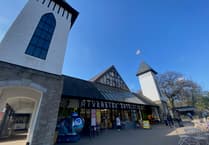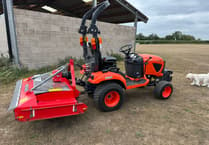A DARTMOOR family farm is locked in a battle with Natural England, after their grazing rights were removed from common land on Dartmoor, in an area that has been grazed for generations.
Roy and Helen Radmore have been farming at Glen Iris Farm in Southern Dartmoor for decades. Previously, they and other graziers on the local common were participating in a Higher-Level Stewardship (HLS) Scheme which came to an end last year.
Despite intense negotiations, it was not possible to agree to a rollover of the agreement with Natural England.
This was due in part to its insistence that grazing levels on the common, covered by a Site of Special Scientific Interest (SSSI) designation, needed to be pulled back to lower levels after the SSSI was deemed to be in ‘unfavourable condition’.
Having failed to agree on a rollover of the HLS agreement, the Radmores decided to continue grazing at the same level set out by the previous agreement.
However, Natural England objected and threatened enforcement action, arguing that the Radmores had no consent for any grazing on the SSSI.
The Radmores, therefore, worry for the future, not just of their business and way of life, but of the ecological health of the common.
Helen Radmore said: ‘This will take my whole business away unfairly and for no benefit to the environment. But it’s not just wrong for me, it’s wrong for the whole of Dartmoor.
‘Most people see Dartmoor as wild and beautiful, but if you took the stock off, it will become overgrown with dense, impenetrable scrub and a fire hazard.
‘Hefted animals are connected to the moor, that is where they live, that’s their home.
‘We’re being asked to take 350 sheep off the moor for the whole of the winter. You can’t expect an animal to live enclosed on a farm in the winter and then go back to an area that isn’t enclosed, that has no borders, in the summer.
‘They can’t go back, they’ll stay next to the moor gate, which means you’ll get overgrazing in certain places, which isn’t what Natural England wants either.
‘We don’t disagree with stock management, never have done, but you need to balance all of the issues. There’s so many aspects to it, and I don’t think that Natural England has considered all aspects.’
George Dunn, CEO of the Tenant Farmers Association, said: ‘Sustainable and appropriate levels of grazing are essential for the management of these sensitive sites. However, Natural England appears to have a blinkered approach to the wider issues going on and that needs to change. The TFA very much hopes that the Radmores will be successful in their appeal.’
Natural England stated: After reviewing the ecological evidence, Natural England concluded the condition of the protected interest features on the area of land to be grazed had declined directly due to over-grazing pressures.
‘As a result of this finding, Natural England was unable to consent to the grazing management proposed.
‘Natural England has an important role in working in partnership with local landowners, farmers and commoners to promote sustainable framing and nature recovery, including advising on the management required to secure the favourable condition of Sites of Special Scientific Interest so that the wildlife value of these sites is secured for the long term.’





Comments
This article has no comments yet. Be the first to leave a comment.